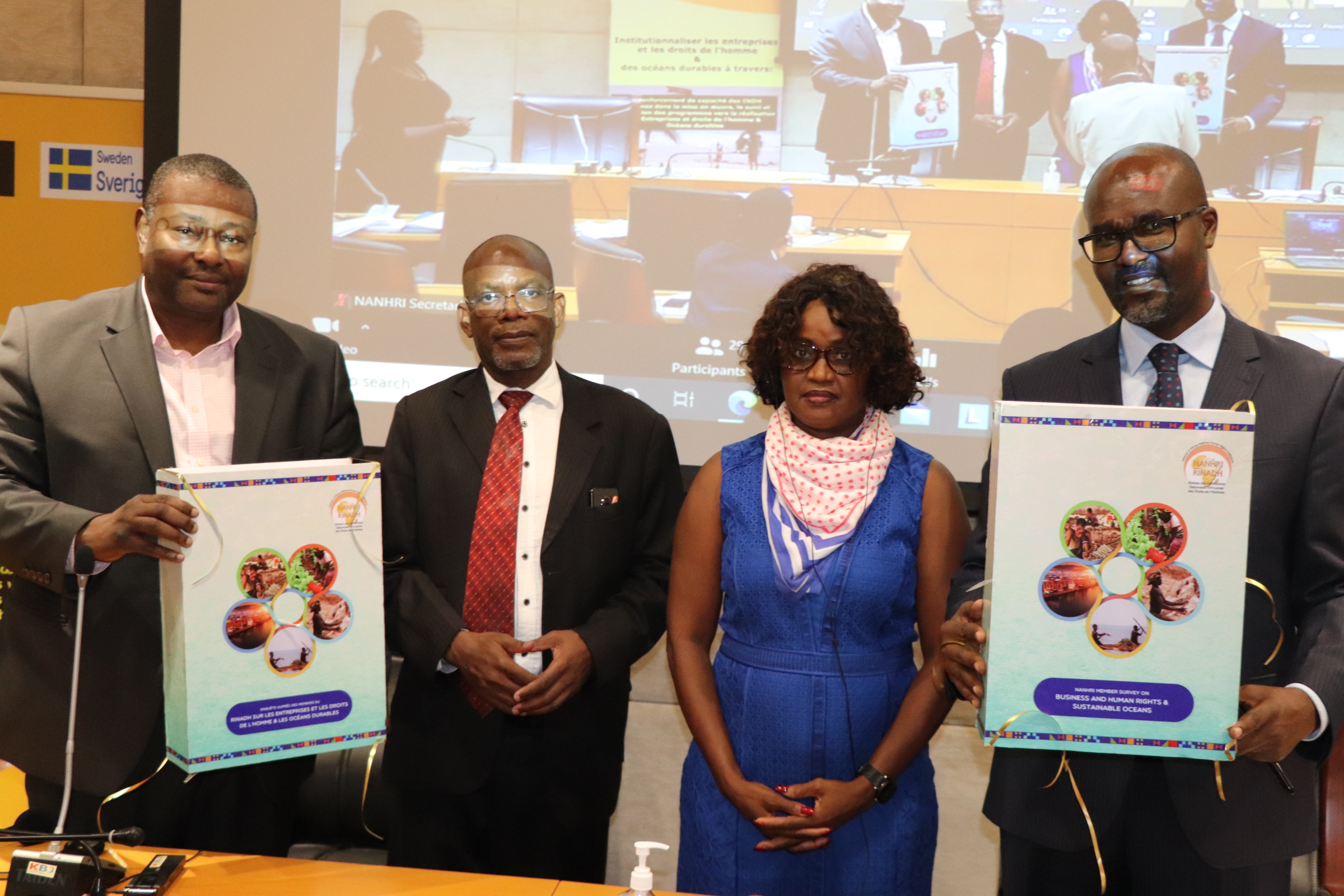- Home
- Who we are
- What we do
- Our Areas of Intervention
- Strategic Plan
- Conflict Resolution & Peace Building
- Resources
- Opportunities
- Africa Human Rights Database

ACHPR Commissioner Mudford Mwandenga (second left) leads NANHRI team in launching of the NANHRI Survey on BHR and Sustainable Oceans on April 13, 2022 in Banjul, the Gambia. Others are The Gambia national Human Rights Commission Chairperson Emmanuel Joof (left), Commissao Nationale Para os Dereitos Humanas-Guinea Bissau, Chairperson Fernanda da Maria Costa and NANHRI Executive Director Gilbert Sebihogo. Photo: Secretariat.
The work under business and human rights and sustainable development is based on the Agenda 2030 of the Sustainable Development Goals and Agenda 2063 of the African Union. Both development blueprints, which were adopted in 2015 – have a direct impact on human rights, hence the need to involve national human rights institutions in conceptualization and implementation of development plans.
NANHRI has prioritized this in the Strategic Plan of 2021-2025 under Objectives 1 and 2: Enhancing the capacity of African NHRIs to deliver on their mandate and enhancing the promotion and realization of human rights in Africa. In light of the two development agendas, NANHRI’s work on Business and Human Rights (BHR) is to strengthen African NHRIs’ capacities to work on:
This is through continuous identification of the current BHR priorities for members and NANHRI’s role in this regard.
In 2021, NANHRI in collaboration with the Danish Institute for Human Rights (DIHR) have set out to implement a member survey on Business and Human Rights (BHR) & Sustainable Oceans (including a focus on Sustainable Development Goal 14 (SDG14), fisheries and aquaculture, and the Africa Blue Economy Strategy 2019.
This work is guided by the NANHRI Member Survey on Business and Human Rights & Sustainable Oceans as a follow-up to the 2013 mapping survey of African National Human Rights Institutions on Business and Human Rights after the adoption of the Yaoundé Plan of Action in 2012 and the NANHRI Strategic Plan 2012-14. The 2013 survey assessed the engagement, needs, capacities and priorities.
Following the adoption of Agenda 2030 of the SDGs and Agenda 2063 of the African Union in 2015, the Network of African NHRIs held the 11th Biennial Conference in November 2017 culminating in the adoption of the Kigali Declaration and Action Plan of the African NHRIs. The Kigali Declaration and Plan of Action emphasized the role of African NHRIs in ensuring a human rights-based approach to sustainable development at the national level.
The 2021 survey on Business and Human Rights and sustainable oceans will support NANHRI to assess the understanding and engagement of African NHRIs on the Africa Blue Economy Strategy that was developed by the African Union in 2019, Development of a baseline on NHRI engagement and entry points on the blue economy and development of Cases studies. The findings of the survey will be used to develop policy documents for further engagement by NANHRI and the members on Business and Human Rights, and Sustainable Oceans in National, Regional and International processes and spaces.
Business and Human Rights – A Guidebook for National Human Rights Institutions
This regional supplement to Business and Human Rights – A Guidebook for National Human Rights Institutions introduces African regional frameworks and standards relevant to business and human rights, such as key human rights conventions and governance institutions of the African Union, the Action Plan for Implementing the Africa Mining Vision, and regional financial institutions.
The chapter concludes with some NHRI practice examples in the area of business and human rights. After working through this chapter, you should be able to answer the following key questions:
Click here to download the Guidebook for National Human Rights Institutions
Guiding Principles on Business and Human Rights
“Guiding Principles on Business and Human Rights: Implementing the United Nations ‘Protect, Respect and Remedy’ Framework” were developed by the Special Representative of the Secretary-General on the issue of human rights and transnational corporations and other business enterprises.
The Special Representative annexed the Guiding Principles to his final report to the Human Rights Council (A/HRC/17/31), which also includes an introduction to the Guiding Principles and an overview of the process that led to their development.
The Human Rights Council endorsed the Guiding Principles in its resolution 17/4 of 16 June 2011.
For more information, Click here to download Business & Human Rights Guide Book
First Regional Workshop on Business and Human Rights in Yaoundé, Cameroon
To follow up on the outcome of the Edinburgh Conference and the commitments made by the regional NHRI Networks, Network of African National Human Rights Institutions (NANHRI), held the Yaoundé regional workshop from 29 September to 1 October 2011 which culminated into the Yaoundé Plan of Action. The Yaoundé Plan of action highlighted key responsibilities of NANHRI, NHRI’s, they include;